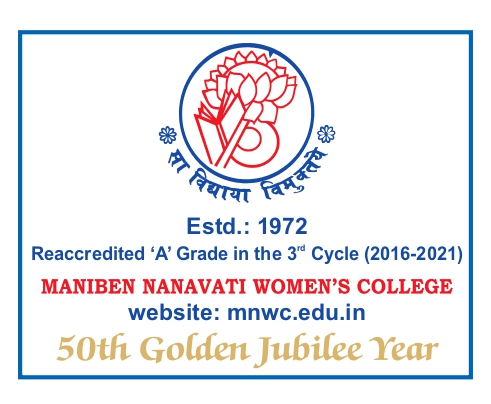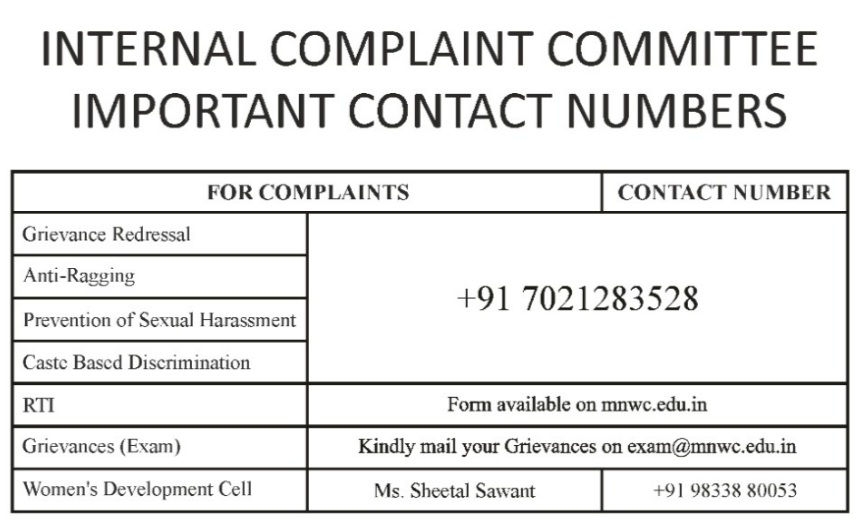Internal Complaints Committee
The ICC (Internal Complaints Committee), Maniben Nanavati Women’s College has been formed as per the norms of MHRD and UGC, New Delhi
The functions of the Committee would be -prevention, prohibition and redressal of sexual harassment of women employees and students in college premises
ICC shall comply with the procedure prescribed in the aforementioned UGC regulation 2016 and the sexual harassment act for inquiring into the complaint in a time bound manner
Sexual Harassment of women at workplace (Prevention, Prohibition & Redressal) Act 2013. In accordance with the UGC (Prevention, Prohibition and Redressal of Sexual Harassment of Women Employees and Students in Higher Educational Institutions) Regulations, 2015, the College has an Internal Complaints Committee (ICC) comprising of External and Internal Members
As per the guidelines of UGC and the Supreme Court an Anti Sexual Harassment Cell has been established by the College to provide a healthy and congenial atmosphere to the staff and students of the College.
The cell is constituted to meet the following objectives:
- To develop the guidelines and norms for a policy against sexual harassment.
- To develop principles and procedures for combating sexual harassment.
- To work out details for the implementation of the policy.
Composition: (Section 7 of the 2013 Act provides that an Internal Complaints Committee is to have a minimum of five members)
- Presiding Officer (A woman faculty member employed at a senior level; not below the level of an Associate Professor at the educational institution)
- Two faculty members and two non-teaching employees preferably committed to the cause of women or who have had experience in social work or have legal knowledge
- Two students who are enrolled at the undergraduate and masters’ levels respectively, elected through transparent democratic procedure
- One member from amongst non-governmental organizations or associations committed to the cause of women or a person familiar with the issues relating to sexual harassment
- At least one-half of the total members of the ICC shall be women.
Note:
Persons in senior administrative positions in the HEI such as Registrar, Heads of Department, etc shall not be members of ICCs in order to ensure autonomy of their functioning.
The term of office of the members of the ICC shall be for a period of three years. HEIs may also employ a system whereby one-third of the members of the ICC may change every year
Procedure
- An aggrieved person (complainant) is required to submit a written complaint to the ICC within three months from the date of the incident and in case of a series of incidents within a period of three months from the date of the last incident
- Friends, relatives, colleagues, co-students, psychologist or any other associate of the victim may file the complaint in a situation where the complainant is unable to make the complaint on account of physical or mental incapacity
- Upon receipt of the complaint, one copy of the complaint will be sent to the respondent within a period of seven days from the receipt of the complaint.
- If the Enquiry Committee is of the opinion that the matter is sensitive then immediate interim relief under Chapter V, Clause 12 (1) (a) of The Sexual Harassment of Women at Workplace (Prevention, Prohibition and Redressal) Act, 2013 is provided to the Complainant
- Interim relief to the Complainant is also given in the shape of leave/ transfer of the Complainant to any other department for the time being until the case is resolved.
- The respondent is required to file his/her reply to the complaint along with a list of documents, and names and addresses of witnesses within a period of ten days
- The concerned department is also requested to provide CCTV Camera footage of the incident if any through the college head.
- The inquiry has to be completed within a period of ninety days from the receipt of the complaint
- The inquiry report has to be submitted within ten days from the completion of the inquiry to the college head. A copy of the inquiry report will also be provided to the complainant and the respondent.
- The complainant may seek conciliation in order to settle the matter. However, no monetary settlement should be made as a basis of conciliation.
- The college will facilitate the conciliation process through the ICC, as the case may be, once it is sought.
- Anyone found guilty shall be punished in accordance with the service rules.
- The resolution of the conflict to the full satisfaction of the aggrieved party/complainant, wherever possible is preferred to purely punitive action.
- The identities of the aggrieved party / complainant, witnesses and the respondent / offender will remain strictly confidential. All the files and reports are kept confidential in the office of the Internal Complaints Committee in custody of the Presiding Officer, ICC.
- In case of false / malicious complaints which are found to be untrue or forged or misleading, the complainant will be liable to be punished as per the provisions of the act
| Sr. No. | Constitution of the ICC | Members |
|---|---|---|
| 1. | A Presiding Officer – a woman employed at a senior level at the workplace from amongst the employees. [Sec.4 (2) (a)] |
Dr. Cicilia Chettiar (9820310848) |
| 2. | Not less than two Members – from amongst the employees preferably committed to the cause of women OR who have had experience in social work OR have legal knowledge. [Sec.4 (2) (b)] |
Ms. Neha Bhansali (9821317349) Mrs. Sheetal Sawant (9833880053) Ms. Shruti Gala Advocate Gauri Chhabria |
| 3. |
One Member – from amongst NGOs OR associations committed to the cause of
women OR a person familiar with issues relating to sexual harassment. [Sec.4 (2) (c)]
|
Ms. Asha Kulkarni (9819373522) Mr. Suketu Jarivala (9820737779) |
| 4. |
Under the UGC guidelines of May 2016, , the membership has extended to include
three elected student members
|
Ms. Sneha Raut Ms. Zeel Gala Ms. Netra Shah |
| 5. |
Two nominated non-teaching members
|
Ms. Keyaa Mukherjee (9890753753) Mr. Naresh Lad (9969163945) |
UGC (Prevention, Prohibition and Redressal of Sexual Harassment of women employees and students in Higher Education Institutions) Regulation, 2015 – CLICK HERE
Sanksham Guidelines – CLICK HERE
Vishakha Guidelines – CLICK HERE
As pe the UNIVERSITY GRANTS COMMISSION NOTIFICATION New Delhi, the 6th May, 2019 F.No. 14-4/2012(CPP-II).— all the higher education institutions, whether established or incorporated by or under a Central Act or a State Act, and every institution recognized by the University Grants Commission under clause (f) of Section 2 of the University Grants Commission Act, 1956 should establish a Grievance Redressal Cell.
Maniben Nanavati Women’s College has a well defined body for the same:
- The Composition:
Sr. No. Name Designation Status 1. Dr. Twinkle Sanghavi Senior Members of the Teaching Faculty to be nominated by the Principal Members 2. Dr. Cicilia Chettiar Senior Members of the Teaching Faculty to be nominated by the Principal Members 3. Ms. Sheetal SawantSenior Members of the Teaching Faculty to be nominated by the Principal Members 4. Ms. Dhruvi Patel (SYBA)A Representative from among students of the college to be nominated by the Principal based on academic merit/excellence in sports / performance in co-curricular activities Special Invitee - The term of the members and the special invitee shall be two years. The Special Invitee need not remain present in cases of grievances related to staff members.
- The quorum for the meeting including the Chairperson, but excluding the special invitee, shall be three.
- In considering the grievances before it, the GRC shall follow principles of natural justice.
- The GRC shall send its report with recommendations, if any, to the Chair Person of the Management of the College and a copy thereof to the aggrieved student,/staff member within a period of 15 days from the date of receipt of the complaint.
After the enactment of the Sexual Harassment of Women at Workplace (Prevention, Prohibition and Redressed) Act, 2013 and its notification by Government of India, University of Delhi issued notification No. Estab.II(1)/27/ACC/2006/ dated 9 January, 2014 declaring that the provisions of this Act supersedes the University Ordinance XV-D. Further, vide its Notification No. Estab.II(i)/027/ACC/2006 dated 16 January, 2014 the University of Delhi constituted its own Internal Complaints Committee as required under the Act and directed all colleges/institutions under it to constitute their own Internal Complaints Committees.
According to the Act of 2013, Maniben Nanavati Women’s College is committed to maintain and create an academic and work environment free of sexual harassment for students, academic staff and non-teaching staff of University of Delhi.
Sexual Harassment shall include, but will not be confined to, the following:
- When submission to unwelcome sexual advances, requests for sexual favours, and
verbal or physical conduct of a sexual nature are made, either implicitly or explicitly, a ground for any decision relating to employment, academic performance, extracurricular activities, or entitlement to services or opportunities at University of Delhi. - When unwelcome sexual advances, verbal and non-verbal and/or physical conduct such as loaded comments, remarks or jokes, letters, phone calls or e-mails, gestures, exhibition of pornography, lurid stares, physical contact, stalking, sounds or display of a derogatory nature that have the purpose and/or effect of interfering with an individual’s performance or of creating an intimidating, hostile or offensive
environment. - When a person uses, with a sexual purpose, the body or any part of it or any object as an extension of the body in relation to another person without the latter’s consent or against the person’s will, such conduct will amount to sexual assault.
- When deprecatory comments, conduct or any such behavior is based on the gender
identity/sexual orientation of the person and/or when the classroom or other public
forum of the University is used to denigrate/discriminate against a person or create a hostile environment on the basis of a person’s gender identity/sexual orientation.
The Process:
The institution has adopted Zero Tolerance approach towards any kind of sexual
harassment acts:
- Any aggrieved woman may make, in writing, a complaint of sexual harassment at workplace to the Internal Committee within a period of three months from the date of incident and in case of a series of incidents, within a period of three months from the date of last incident,
- Where the aggrieved woman is unable to make a complaint on account of her physical or mental incapacity or death or otherwise, her legal heir or such other person as may be prescribed may make a complaint under this section.
- The Internal Complaint Committee may before initiating an enquiry if requested by the aggrieved woman to take steps to settle the matter between her and the “respondent” through conciliation.
- If the aggrieved woman and the respondent arrive to a settlement, the copies of the same to be given to both the parties. shall record the settlement so arrived and forward the same to the employer (Principal) to take action as specified in the recommendation.
- The Employer (Principal) will provide assistance to the woman if she so chooses to
file a complaint in relation to the offense under the Indian Penal Code or any other
law for the time being in force.
Policy On Sexual Harassment
Complaint Form
Copyright © 2020. All Rights Reserved to Maniben Nanatvati Women’s College | Powered by WhiteCode




